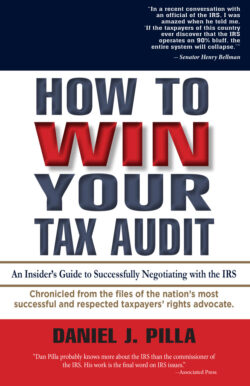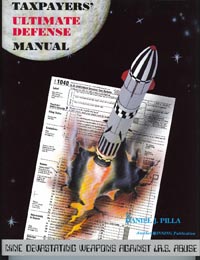QUICK SOLUTIONS
TO THE MOST COMMON TAX PROBLEMS
Ground rules you can set for an audit
If you receive an audit notice from the IRS, it is very important that you know the rules and even more important to let the IRS know you are not an uninformed citizen. The more rights you assert, the better off you will be. You begin to assert those rights by establishing the ground rules of an audit. In my book How To Win Your Tax Audit, I identify numerous ground rules. Here are four of them:
1. You have the right to conduct the audit at a time and place that is convenient to you. Use this right to prepare and avoid being caught off guard.
2. You have the right to record an audit as long as you give the IRS the same right. Using this right prevents the IRS from changing the rules midway through the audit.
3. You have the right to limit the scope of the audit to avoid time and trouble discussing issues not relevant to your tax liability.
4. For more information about the eleven ground rules you must establish to insure a fair audit of your tax return, order my book How to Win Your Tax Audit.
How to call IRS bluffs
Former Senator Henry Bellmon once said, “In a recent conversation with an official of the IRS, I was amazed when he told me, ‘If the taxpayers of this country ever discover that the IRS operates on 90% bluff, the entire system will collapse’.”When you know what these bluffs are, you will never be forced to pay taxes you do not owe.
Here are some common bluffs:
-
Bluff One – You cannot claim a deduction without a receipt or canceled check.
Bluff Two – You have no right to challenge an auditor’s decision
Bluff Three – You must disclose every aspect of your financial life.
These claims are not true. You have rights — and when you use them, you will pay less tax with less hassle. For more information, order my book How To Win Your Tax Audit.
Proving deductions without a receipt
Some IRS auditors would have you believe you must have a receipt or canceled check to claim a deduction. But, there are six ways to prove deductions if your records are lost. Few people realize that oral testimony is often enough to claim a deduction as long as the testimony is believable and supported by the facts. Affidavits and reconstructed records are also valuable tools used to claim deductions where typical records are unavailable. Cash contributions are a good example of deductions that go unclaimed because of the lack of written records. To prevent the IRS from claiming you have insufficient records to claim a deduction, know your rights.
For more information, order my books How To Win Your Tax Audit, and The IRS Problem Solver Book.
IRS forms you should never sign
In an audit there are forms the auditor may ask you to sign that can take away your rights. You could lose your right to appeal, your right to claim deductions and your right to prevent enforced collection action.
Form 4549 is one of these forms. Signing it constitutes an agreement that you owe additional taxes and waives your right to appeal. For more information order my book How To Win Your Tax Audit.
How to spy on the IRS
Few people know the IRS keeps secret records about every citizen. One such record is called your Individual Master File. Knowing the content of this file can be very useful to you. It’s like spying on the IRS. For example, everything the IRS intends to do regarding one or more of your tax returns is reported in this file. When you use my techniques for accessing these files (you have this right under the Freedom of Information Act), you can predict audits, collection actions — even criminal prosecutions. How well could you prepare for IRS actions against you if you knew months ahead of time when they were coming?
For information on how you can spy on the IRS to protect your wealth and property, order my book Taxpayers’ Ultimate Defense Manual. Don’t be caught off guard.
Audits by mail
Just the thought of having to deal with the IRS often scares people into submission. But did you know you have the right to conduct an audit by mail? As long as you set the ground rules as discussed earlier and cooperate fully in providing the IRS with details of your claims, you can conduct an audit through the mail and never have to worry about a face-to-face confrontation.
The greatest advantage to conducting an audit by mail is that you will never be caught off guard. You will never have to answer questions without being able to gather all the facts and provide only accurate answers to the questions asked. It is not uncommon for the IRS to make arbitrary determinations based on information they obtain that is really irrelevant to the return and its claims. Avoid this trap by conducting your audit by mail.
You can learn all you need about the Mail-Order-Audit from my book The IRS Problem Solver. and How To Win Your Tax Audit
How to appeal an audit decision
Most people believe that IRS auditors have all the power. But did you know an IRS auditor really has no power to change your tax liability, charge a penalty or seize your assets? In fact, an IRS auditor has no power to do anything without your permission.
When you disagree with an IRS auditor, you have the right to bring an audit decision to a higher level of authority. This process is called the Right of Appeal. Just knowing this right often prevents the auditor from trying to bluff you into paying more tax than you owe. It’s the best negotiating tool you can have. To learn more about your right to appeal an auditor decision, order my book How To Win Your Tax Audit.
How to recover the cost of an abusive audit
The IRS’s own internal statistics show that when challenged, the decisions made by IRS auditors are wrong between 60 to 90 percent of the time. If an auditor tries to deny your rights and collect more money than you owe, you have the right to appeal that decision. You can also potentially recover the fees and the costs you pay for carrying out the appeal.
These costs may include travel, professional fees, postage, parking or any other cost incurred to defend against unjust claims. For more information on how to recover fees and costs, order my book, Taxpayers’ Ultimate Defense Manual.
When and how to use Tax Court
Just knowing that you have the right to go to the Tax Court can prevent you from ever having to use it. Petitioning the Tax Court is the ultimate appeal of a decision made by an IRS auditor. Statistics show that citizens who use their right to appeal auditor decisions, along with their right to petition the Tax Court, win 60-90% of the time.
Statistics also show that, in most cases, when a Tax Court petition is filed, the case never goes to trial. In every case, the IRS tries to avoid a trial by negotiating a settlement. Tax Court is your court — but only when you know how to use it. For information on how to use the Tax Court to defend yourself from unjust audit decisions, order my book Taxpayers’ Ultimate Defense Manual.
Solutions - Book Packages
Package 1
IRS Abuse Prevention Package $59
Includes:
- Small Business Tax Guide
- How to Win Your Tax Audit
Package 2
Tax Problem Resolution Package $75
3 Best Sellers
Includes:
- How to Get Tax Amnesty
- The IRS Problem Solver
- How to Win Your Tax Audit
IRS Defense Library $249
Includes:
- All of Dan's Current Books
- One year of Pilla Talks Taxes
Dan's electronic newsletter
Back to Quick Solutions Packages Back to Top
Packages qualify for one free 15 minute phone consult with Dan...$99 value



